- Home
- Patrick E. Andrews
Crossed Arrows 3 Page 9
Crossed Arrows 3 Read online
Page 9
Thornton growled, “Don’t you call me ‘bud!’”
Jesse leaned on the desk, glaring at the man. “I’m just about to call you a hell of a lot worser than that…bud.”
By now Hawkins had settled down. “There’s only one way we can put an end to all this. We’ve got to cross the border into Mexico and trail them to their hideout. I can guarantee you we’ll put ’em out of business, sir.”
“You will not—not—NOT—enter the sovereign territory of the Mexican Republic, Captain. So just put that tactic out of your mind.”
“Sir,” Hawkins said, “our mission here should be canceled. We can’t accomplish a godamn thing. So you might as well send us back to Fort Lone Wolf.”
“Your attitude is close to seditious, Captain! Here are the only orders I’ll give you. Stay here and wipe out that gang. That’s all they are! A godamn gang. My God! They’re a bunch of stupid Mexican peasants who’ve gone bad. Can’t you handle that?”
“I’ve nothing more to say,” Hawkins stated.
“Then you are dismissed to follow these latest orders,” Thornton said. “And since I’ll be staying here at Fort Duncan, I want you to send daily telegrams to me to report your activities and locations.”
Hawkins and Ludlow saluted, then made an about face. Jesse grinned at the major. “You’re a real piece of work, you know that, bud?”
The three left the office.
~*~
Now, at a small bivouac set up in the early evening at the edge of Fort Duncan, Mack Hawkins, Ludlow Dooley, Eagle Heart and Jesse Buford, sat around a small campfire, grousing among themselves about the lack of information or meaningful support provided by the Gulf Military Department.
“We can only do our very best,” Ludlow said.
Eagle Heart spoke with the wisdom and logic of an Indian warrior. “Not hard to figger out. We got to follow trail and attack the village of bandits down there. Is only way to stop ’em. Got to kill ’em down there.” He pointed southward.
“We can’t,” Ludlow explained. “You remember what Captain Patterson told us when we first got here. Well, we just heard the same thing from that major.”
Eagle Heart snorted. “I not care.”
Ludlow was adamant. “We have to obey orders, Sergeant. Remember you’re a noncommissioned officer in the United States Army.”
“Mmf!” Eagle Heart snorted again. “Sometime I wonder how Army beat my tribe and the Comanche tribe.”
“We starved ’em,” Captain Mack Hawkins said. “We destroyed their encampments and burned their belongings. The tribes didn’t have any choice but to move onto the agency.”
“Mmf!” Eagle Heart repeated for the third time. “Good thing for you Kiowas and Comanches not live in Mexico, eh?”
Sixteen
All was quiet in the Vengador encampment atop Cupula Mountain. This steeply elevated terrain feature was an earthen dome located on the Chihuahuan desert some fifteen kilometers south of the Rio Grande. It offered little inducement for settlement by farmers because of its isolation as well as the steep climb to the apex.
The area at the top was open and measured approximately seventy-five meters across on all sides. Additionally a bubbling spring within the trees on the north rim guaranteed an unending source of cool water This was located a short distance inside a thick forest of palo verde and pinyon pine trees that surrounded the area. The copious cover was an excellent wind break and stretched down the mountain’s slopes to a spot where the desert prevented further growth.
Comandante Karl Jager considered the location a garrison and he insisted on guard duty, mess calls, drill and other such military activities to maintain efficiency and discipline. Two large tents—one for a headquarters and the other for the two comandantes’ quarters—had been erected under some overhanging branches of a palo verde tree. The vengadores had smaller shelter tents for two individuals each on the opposite side of the clearing.
Sanitation was the most important consideration after security. A slit latrine was dug in an area below the spring, and strict orders were issued that it be used for defecation. The vengadores were used to outhouses and found that squatting down with a foot on each side of a narrow ditch awkward and a little embarrassing. At least urination was permitted on the downside ground of the outer perimeter.
A sheltered area within the trees was chosen for the storage of ammunition while food was kept in a cool spot within a small stand of boulders. A tarpaulin had been stretched over it to make sure no sunlight would warm the rations. The horses were kept in a corral on the western edge of the bivouac. There was no proper grazing for the animals, so forage had to be brought up from San Patricio.
When all the preliminary work was done, Comandante Jager considered defensive measures. After fighting in similar surroundings while serving in French Indo-China, he knew the proper thing to do. He ordered the digging of unconnected trenches in strategic positions around the perimeter. The ex-legionnaire would have liked to clear areas of trees downward on the slopes for expanded fields of fire, but bare spots would attract attention from the desert below.
Regularly scheduled trips were made back to San Patricio for needed rations, equipment and tools to maintain an orderly and secure area.
~*~
Two weeks after the establishment of the hilltop garrison, Lieutenant Roberto Gonzales and Sergeant Humberto Sanchez made an appearance in the area. The two spies were the ones who had discovered and explored the top of Cupula Mountain. Now, returning to the spot for the first time, Gonzales and Sanchez reached the hidden entrance at the bottom of the natural dome. This was the location of the trail that led upward to the garrison. They were favorably impressed when challenged by guards before they began the ascent to the encampment. After they were cleared to begin the climb, they rode up the trail until emerging into the garrison proper.
They headed directly to the command post and dismounted. Jager and Gomez looked up from a making a list of needed supplies when the two spies appeared at the tent opening.
“Welcome,” Jager said “We hope you brought us some interesting news.”
“Indeed we have,” Gonzales replied. “We discovered another target and Colonel Valenzuela wants you to attack it.”
“We brought a sketch map with us,” Sanchez added. “I apologize I could not make it to scale, but it was the best I could do.”
Gomez pointed to the interior of the tent. “We have an excellent table on which to spread your drawing, Sergeant.”
The four went inside and Lieutenant Gonzales began his briefing. “There is a stage coach line that travels north along the Rio Grande from Santo Cielo to Tobeyville.”
Jager and Gomez found the places on the map. “How far is it between the two towns?”
“We estimate some sixty kilometers,” Gonzales replied. “There is an area of rolling hills where the road makes some narrow turns. The drivers slow the horses to a walk at one that’s particular sharp. That is where you should strike. The brush is thick along the road and makes it a perfect spot for an ambush.”
“Are we to rob a stage coach?” Gomez asked.
“Exactly,” Gonzales answered. “Take whatever strongboxes and mail they have. Afterward el coronel wants all the travelers killed.”
“We can do that, of course,” Jager said.
“Colonel Valenzuela thinks it is time to really infuriate the Gringos,” Gonzales clarified. “We have reached a point in the campaign where we need to stimulate a more violent reaction to our efforts.”
“That is plausible,” Jager remarked. “Have you discovered any conspicuous reactions from the enemy so far?”
Sanchez shrugged. “There is supposedly a small detachment of cavalry wandering about the area. But they’ve shown no inclination to cross the river into Mexico.”
“But we have never seen them,” Gonzales added.
“We must provoke a fight with that unit,” Gomez stated. “Wiping them out would incite a major reaction from the American
Army.”
“True,” Jager agreed. “But right now we must concentrate on waylaying that stagecoach. It is a most significant target.”
“Exactly,” Gomez said. “I will order Sergeants Sulivan and Rayan to ready their teams for the assignment.”
Seventeen
Tim Harrigan and his wife Carmela sat in the shade of a large Montezuma cypress tree in the enclosed patio of their mansion. This was located within the four sides of the luxurious dwelling with a wide opening to the sky. Comfortable outdoor furniture with wide umbrellas and a fire pit for cold winter evenings completed the amenities.
Carmela was reading the novel Tres Mosqueteros translated into Spanish from the French when her rapt attention in the book was suddenly disturbed. No noise caused the disruption, instead it was the silence of her husband. Their affinity was so strong and intimate, that one could sense the moods of the other. Her husband had not uttered a single word since they sat down, and Carmela sensed he was anxious and worried about something.
She leaned toward him. “Is something wrong, querido?”
“Huh?” Harrigan uttered.
“You have not made a sound since we came out here.”
“Oh, I am just thinking about some business. There is nothing to fret over. But it is somewhat complicated.” He smiled at her. “Are you enjoying your book?”
“I certainly am!” Carmela answered. “It involves my most favorite subjects to read about; amor y aventura.”
Harrigan chuckled. “Well, I shall just sit here quietly while you peruse that world of romance and adventure.”
She turned her attention back to the novel while Harrigan concentrated on the subject that troubled him.
Harrigan loved Mexico and hated America, and he sensed that a situation was in the making that would prove devastating to his adopted country. To make this state of affairs more unpleasant, he was going to have to seek help from the Gringos. His past financial activities had required commercial relationships with Americans on several occasions. He was painfully aware they had much more money that their Mexican counterparts and that meant he had to negotiate cautious agreements to be sure there was no undue advantage taken by the wily yanquis
Now there was one more antagonist in the mix. It was the German Kaiser and he was obviously going to be a hundred times worse than any greedy American who had nefarious intentions toward Mexico and its people. Harrigan’s Irish blood boiled at the thought of Latin America being turned into a gigantic colony ruled by Teutonic masters. It hadn’t taken him long to realize it would be impossible to thwart a German takeover without American assistance.
Harrigan was well acquainted with the American ambassador Alan Densmore. The man was a decent sort and at times showed an unusual amount of fairness while acting as a mediator between Minister Harrigan and American entrepreneurs. Harrigan figured there would be two prime difficulties to deal with when it came to informing the ambassador of the Germans’ plan. Firstly, he would have to convince Densmore the truth of the situation; and secondly, he would have to keep from getting assassinated long enough to accomplish his goal.
Carmela sighed and laid her novel on her lap. “Reading makes me sleepy,” she stated, then looked over at her husband. “Why are you frowning, mi amor?”
“Was I frowning?”
“Most assuredly. There is something troubling you.”
He forced a smile. “I think I ate too many jalapeños with my ranchero eggs this morning. My belly feels like it is on fire.”
Carmela shook her head reprovingly. “I have been warning you for years not to put too many chili peppers in that Irish stomach.”
Harrigan thought, I wish that was my only problem.
~*~
The vengadores were arranged along the road that wound through the rolling hills between the towns of Santo Cielo and Tobeyville, Texas. A tree had been cut down and dragged out to block the route of the stagecoach they were waiting to ambush.
Sub-Comandante Santiago Gomez’s team was arranged along the north side of the crude thoroughfare facing a wall of boulders opposite their positions. The vengadores belonging to Comandante Jager were farther down, hidden in the dense scrub. All had found excellent firing positions in which to employ their Berthier carbines.
The dust cloud of the approaching stagecoach could be seen in the distance, and everyone tensed for the confrontation. When the vehicle came into view around a sharp turn, the driver saw the fallen tree and pulled back hard on the reins, while pushing down on the wooden brake lever with his foot. The horses came to a halt a few short yards from the obstruction.
Jager stepped into view, aiming his carbine at the guard who cradled a shotgun in his arms. “Throw your weapon into the brush! Raise your hands! Now!”
The man quickly obeyed. The rest of the ambushers emerged and came down to the road. Jager walked over to the stagecoach and opened the door. Four male passengers gazed at him in surprise and shock.
“Get out with your hands up!” Jager commanded.
The travelers did exactly what they were told to do. They turned their eyes on the robbers, confused by their appearances. They noticed that some looked like native Mexicans, others had the appearance of mixed-race mestizos, while others showed rust colored hair and blue eyes.
The driver spoke to Jager. “We ain’t got no strongbox, mister.”
Gomez motioned the passengers to move over to the side of the road. The four obeyed, looking dismayed. The guard eyed the vengadores. “You fellers is the biggest damn gang of robbers I ever seen. By God there’s fourteen of you.”
Jager stepped back, then commanded, “Fuego!”
The vengadores began shooting. The driver was knocked back, then fell forward to slide down to the dashboard. The guard tumbled from his seat to the road while the passengers stood transfixed. One turned and ran for the brush but was shot in the back as his fellow travelers crumpled under another hail of bullets. The horses reared up, whinnying.
“Remove the tree,” Jager ordered.
Several vengadores grabbed the obstruction and pulled it into the scrub. Jager slapped one of the horses on the rump and it pushed against the traces until able to get the stagecoach rolling. Within moments, he and his mate were galloping down the road.
Jager laughed. “I wish I could be in town when that empty wagon comes charging down the street.” He pointed to the dead men. “Take advantage of the situation. I am certain you will find money and valuables.”
“Yes,” Gomez said. “Consider it as souvenirs.”
The vengadores quickly turned to robbing the corpses.
Eighteen
Ministro sin Carpeta Tim Harrigan had to be very careful in setting up a meeting with His Excellency Alan Densmore the American ambassador to the Mexican Republic. If the Irishman was being kept under surveillance by the rebel Mexican officers and/or the Germans, he would be in constant danger. Any contact with the American diplomat would most certainly result in his being assassinated. Even a loyal and professional bodyguard like Fidel could not guarantee his safety.
Harrigan decided not to take any chances and to conduct his clandestine task as if he was under twenty-four hours of observation. The Irishman sent a note via Fidel to the American Embassy asking Densmore to meet with him to discuss an important and ominous matter that affected both their countries. In the message he requested Densmore to pick the time and location.
Fidel returned from his errand with an acceptance of his boss’ request. The ambassador chose an exclusive hunting lodge several kilometers outside Mexico City for the conference. This twenty-five-year old chalet was used by the wealthiest men of the area for hunting and shooting. Over the ensuing decades, the place had evolved into an excellent spot for assignations in which secrecy was paramount. That included business, politics and other covert activities. There were comfortable cabins hidden away in the woods around the main building that were well stocked with liquor and food. They offered comfortable accommodations, including g
ourmet meals served by a discreet staff of waiters.
~*~
On the day of the meeting Harrigan and Fidel arrived early at the cabin he had rented. While the bodyguard stood watch within the trees, Harrigan sipped coffee and nibbled on churro pastry while keeping an observant eye on the path through the trees that led to the front door. He checked his watch now and again, finally noting it was a half hour before the appointed time for the ambassador’s arrival. The Irishman had just lit a cigar when Ambassador Densmore appeared walking toward the cabin in long hurried strides. Fidel stepped into view, waving to indicate all was well.
Harrigan went to the door. “Hello, Alan!”
Densmore held out his hand. “Hello, Tim. So good to see you again.”
Harrigan gestured to the table with liquor and refreshments. “Care for a drink or a bite before we start? There’s coffee, liquor and sweets to nibble on.”
“I’ll have a cup of coffee,” Densmore said. “I have a feeling after reading your note that I’m going to want to be alert and bushy-tailed.” He went to the table and poured the brew into a cup. “Now what’s this ‘important and ominous matter’ you want to discuss with me?”
“We better sit down,” Harrigan said. After they were seated, the minister began. “There are plans in the works by certain members of the Mexican Army’s highest ranks to attack the United States to recover the lands lost by Mexico after the war.”
Densmore chuckled. “Good God, Tim! They lost that conflict! Many Americans are ashamed of what happened, but they wouldn’t be in favor of returning even a single acre of that large territory.” He took a deep swallow of coffee. “Do the Mexicans think they’ll have better luck at fighting us now?”
“I presume you’re acquainted with the Saint Patrick Battalion. I’m speaking of the same one I served in.”

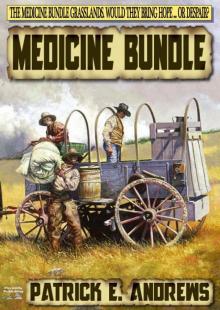 Medicine Bundle
Medicine Bundle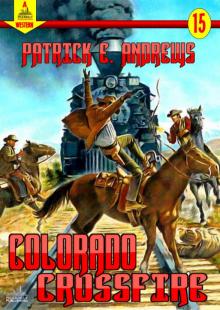 Colorado Crossfire
Colorado Crossfire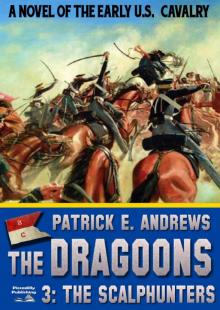 The Dragoons 3
The Dragoons 3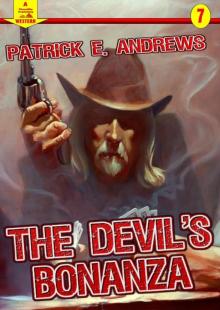 The Devil's Bonanza (A Piccadilly Publishing Western Book
The Devil's Bonanza (A Piccadilly Publishing Western Book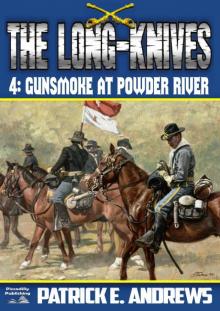 Gunsmoke at Powder River (The Long-Knives #4)
Gunsmoke at Powder River (The Long-Knives #4)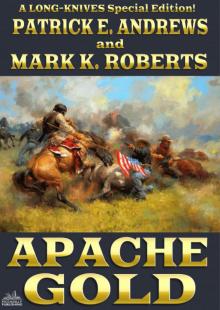 The Long-Knives 6
The Long-Knives 6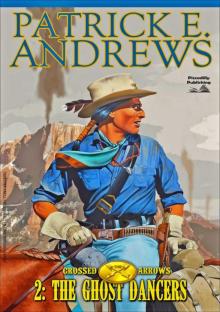 The Ghost Dancers (A Crossed Arrows Western Book 2)
The Ghost Dancers (A Crossed Arrows Western Book 2)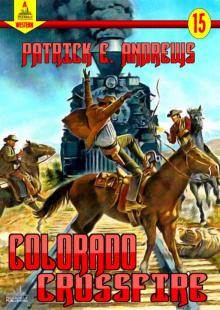 Colorado Crossfire (A Piccadilly Pulishing Western Book 15)
Colorado Crossfire (A Piccadilly Pulishing Western Book 15)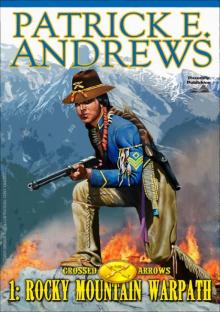 Rocky Mountain Warpath (A Crossed Arrows Western Book 1)
Rocky Mountain Warpath (A Crossed Arrows Western Book 1)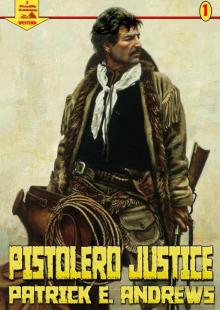 Pistolero Justice (A Piccadilly Publishing Western
Pistolero Justice (A Piccadilly Publishing Western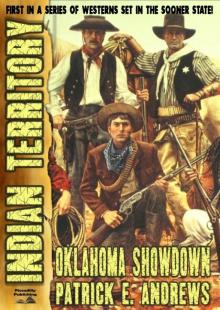 Oklahoma Showdown (An Indian Territory Western Book 1)
Oklahoma Showdown (An Indian Territory Western Book 1)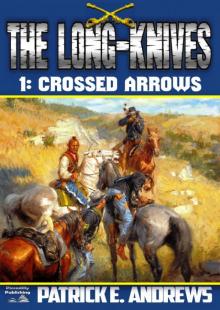 Crossed Arrows (A Long-Knives Western Book 1)
Crossed Arrows (A Long-Knives Western Book 1)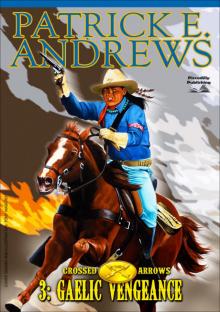 Crossed Arrows 3
Crossed Arrows 3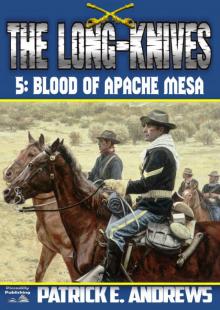 Blood of Apache Mesa
Blood of Apache Mesa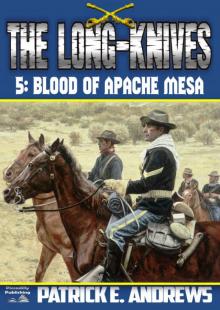 The Long-Knives 5
The Long-Knives 5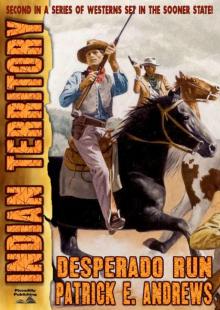 Desperado Run (An Indian Territory Western Book 2)
Desperado Run (An Indian Territory Western Book 2)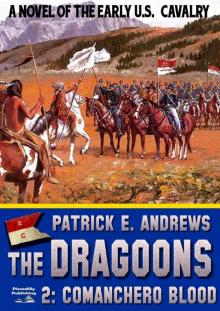 Comanchero Blood (A Dragoons Western Book 2)
Comanchero Blood (A Dragoons Western Book 2)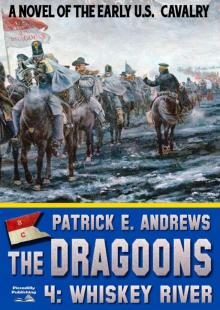 The Dragoons 4
The Dragoons 4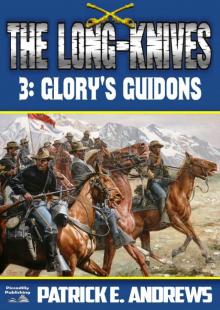 Glory's Guidons (The Long-Knives US Cavalry Western Book 3)
Glory's Guidons (The Long-Knives US Cavalry Western Book 3)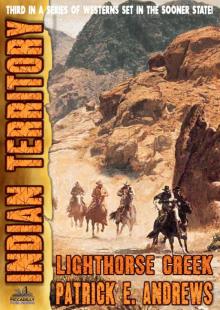 Indian Territory 3
Indian Territory 3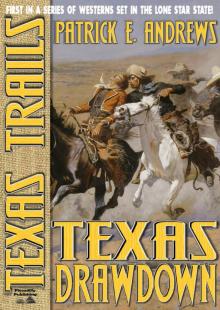 Texas Trails 1
Texas Trails 1